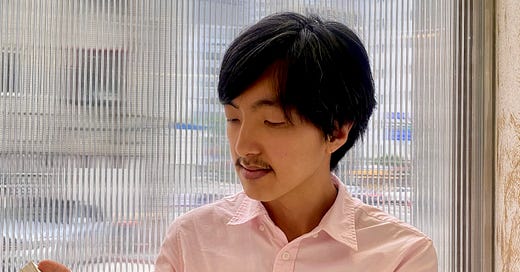*The following review contains no major spoilers.
An avid reader of Gothic horror may be intrigued by a tendency that seems to haunt the genre’s writers: an urge to write in epistolary forms. Each separated by approximately eighty years, Mary Shelley’s Frankenstein, Bram Stoker’s Dracula, and Stephen King’s Carrie are all epistolary novels, despite the differences in their writers and epochs. Ever since Horace Walpole claimed his novel, The Castle of Otranto, to be a translation of a sixteenth-century manuscript discovered in a personal library, the world has seen many notable epistolary Gothic works, including found footage and mockumentary horror films.
In the long list of epistolary Gothic works,
’s RUOK? has been recently added, published on October 7th. (I believe RUOK? belongs in the Gothic genre, as it shows many elements of Gothic literature, such as mystery, unnatural phenomena, an abandoned building, the past haunting the present, etc.) It is a tale told only by text messages between two teenagers, Rori and James. Rori suspects that her father’s death was not an accident and has to navigate through the fragile friendship between her and James while tracking down the secrets of her father and the abandoned lab where he worked as a guard.Futuro’s choice of text messages as the medium of his story is worth discussing. Rori, situated in a small town in Jefferson County, Pennsylvania, and James, who has recently moved to Colorado, do not seem to have any other close friends besides each other. (In a sense, the ongoing text messages between them indicate how isolated they are in real life.) Due to their physical distance, text messages have become the only mode of interaction for them. However, the very mode of communication often becomes the source of misunderstandings, overinterpretations, and quarrels. Although the main plot of RUOK? is Rori’s chase after the eerie cause of her father’s death, the epistolary form itself, in a compelling manner, fuels another plot inextricably intertwined with it: two alienated teenagers drifting apart, notwithstanding none of them actively seek to do so in the beginning.
Another effect of text messages as a device of RUOK? is the fluctuating asynchronism of the characters’ actions and perceptions. In epistolary novels that utilize letters as their medium, events described in them tend to be already relatively far in the past for their sender, and the sender presumes that it will be even farther for the receiver to whom the letters are addressed. Thus, there exists an asynchronism between what happens and when it gets delivered, but the distance between the action and its perception remains rather constant. Rori and James’s text messages, in contrast, either depict what happened before or what is happening to them at the very moment they are being sent, and their receivers may perceive its content almost simultaneously or much later. In fact, the characters checking text messages late, sometimes accidentally and at other times deliberately, brings significant consequences to how RUOK?’s plot progresses. (It should be noted that whenever someone makes a phone call in RUOK?, it always ends up a missed call, which ensures that Rori and James stay in the aforementioned condition of precarious communication.) Such fluctuations not only affect where the story ends up but also create much suspense for the readers, making them anxiously wait for the other character to read the messages and answer back.
In sum, the epistolary form that Futuro chose, text messages to be specific, contributes to the functioning plots of his story in a way that befits the genre, creating a sense of alienation and suspense. Accordingly, RUOK? may be regarded as an example that shows why so many Gothic writers have chosen to write epistolary works.
If you enjoyed my work, you can buy me a cup of tea. I am not a coffee person, by the way.




In Lovecraft's "The Statement of Randolph Carter" the story turns on telegraph messages.
I can imagine a story told through various posts and comment on one or more social media platforms. The IRL person and the online cloud of messages would be contrasted.
Lots of opportunities for the enterprising fictioneer.
Hyun Woo, very interesting. To quibble, I think it's a bit more of a structural analysis (compelling) than a review, though. You haven't given us much of a sense of how you responded, engaged or didn't . . .